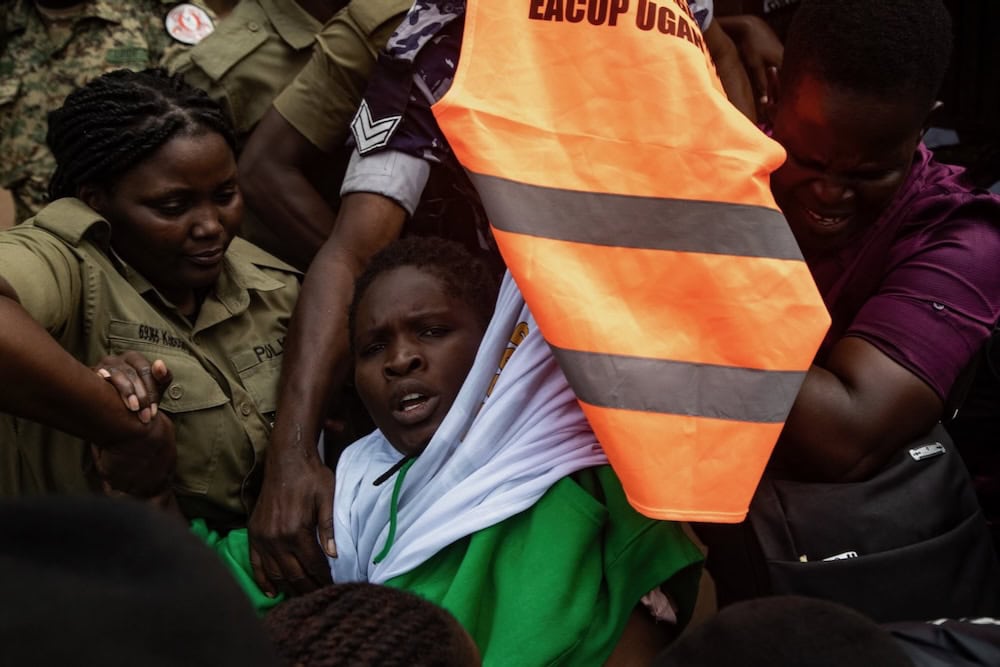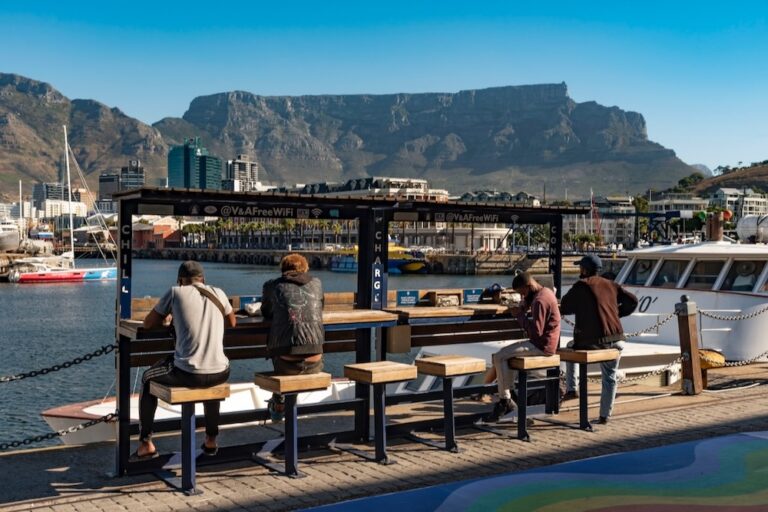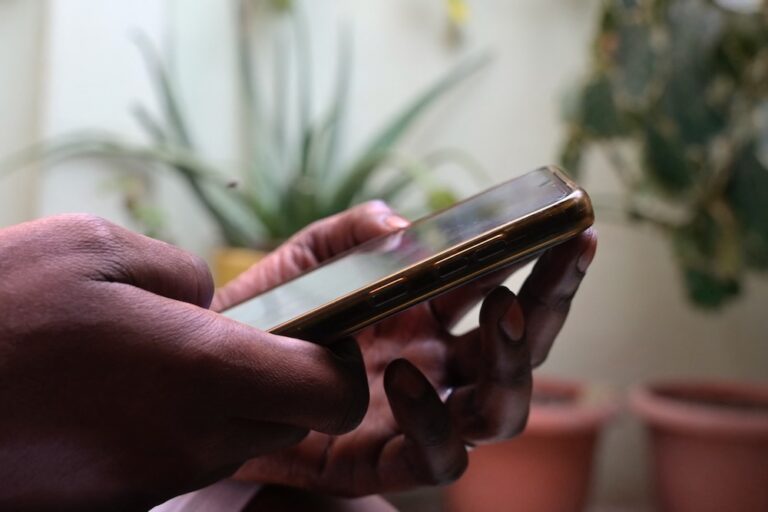August 2024 in Africa: A free expression and civic space round-up produced by IFEX’s Regional Editor Reyhana Masters, based on IFEX member reports and news from the region.
August featured Floriane Irangabiye’s early release – an opportunity for global celebration – while a series of protests across several African countries demonstrated a hostile climate for both the protestors, taking to the streets to get their issues heard, and the African media, working to cover both planned peaceful demonstrations and riots. Nigerian media freedom erodes, and a pageant controversy in South Africa exposes the intersection between gender, misogyny, xenophobia, and violence.
The global celebration of journalist Floriane Irangabiye’s early release from prison on 14 August, following a full pardon granted by Burundi’s President Évariste Ndayishimiye, is blemished by the fact that “her imprisonment was deeply unjust”, as stated by the Committee to Protect Journalists (CPJ).
When she was arrested on 30 August 2022, Irangabiye was visiting family in Bujumbura, while on holiday from Rwanda where she had been living and working for a decade. Four months later, on 2 January 2023, Irangabiye was convicted on charges of “undermining the integrity of the national territory”, after what has been described as a deeply flawed trial. She was sentenced to 10 years in prison and fined one million Burundian francs (USD 482). As Human Rights Watch (HRW) reported at the time: “Her months-long detention without charge and the prosecutor’s failure to produce credible evidence of a crime during the trial amounted to flagrant violations of Burundian and international law.”
Throughout her imprisonment there was a vigorous campaign advocating for her early release and quashing of her conviction by numerous organisations, which included CPJ, Amnesty International, the Burundi Human Rights Initiative, and HRW. In February 2024, CIVICUS – a global civil society alliance – added her to its “Stand As My Witness campaign, which advocates for the immediate release of wrongly imprisoned journalists, activists, dissidents and human rights defenders around the world.”
Reporters Without Borders (RSF), which expressed “huge relief” at Irangabiye’s release, appealed for journalist “Sandra Muhoza – currently facing life imprisonment – to now also be released and the charges against her dropped.” The International Press Institute (IPI) has also condemned her arrest.
Crackdowns, violence around Ugandan political, environmental, and anti-corruption protests
In Uganda, the month kicked off with Human Rights Network for Journalists – Uganda (HRNJ-Uganda) executive director Robert Ssempala issuing a statement condemning police action against journalists covering a press conference called by a faction of the country’s main opposition party, the Forum for Democratic Change.
The police attacked the FDC faction members after they opted to march to the Kenyan High Commission to deliver a petition. When the police realised their assault of the party members was being filmed by the media, they turned on the journalists.
According to the HRNJ-Uganda statement: “Thomas Kitimbo (NBS TV) and Ronald Galiwango (NTV-Uganda) were beaten, while another journalist, Amon Kitamirike (BBS TV), had his camera damaged and his press jacket torn.” The media advocacy group went on to “demand that the police replace the damaged gadgets and take measures to prevent such incidents by reprimanding the culprit police officer.”
Towards the end of August, 21 environmental advocates opposed to the proposed East African Crude Oil Pipeline (EACOP) were arrested in Kampala when they “took to the streets to peacefully demonstrate against the East African Crude Oil Pipeline (EACOP) project, demanding justice, respect for their rights, and an end to the environmental and human rights violations associated with the project.”
There are various objections to the the US$10 billion initiative led by TotalEnergies in partnership with the China National Offshore Oil Corporation (CNOOC) and Uganda’s state oil company. As a result of the pipeline, 419 wells will be dug in the biodiverse Murchison Falls Natural Park and a 930-mile heated crude oil pipeline constructed from Uganda to Tanzania. Not only is the project threatening large expanses of vital wildlife habitats, there is a high risk that over 100,000 people along the route may be involuntarily displaced.
As documented by HRW in their report “Working On Oil is Forbidden’: Crackdown Against Environmental Defenders in Uganda”, the activists have been routinely facing arbitrary arrests, harassment, and threats for raising concerns over EACOP.
A Global Witness investigation looking into “corporate complicity in attacks on defenders challenging the pipeline’s construction,” has also included a list of recommendations for TotalEnergies, global financial institutions and the European Union.
Earlier, in July, anti-corruption protests elicited a ferocious response from authorities, two days after President Yoweri Museveni warned protesters that they were “playing with fire and will not be tolerated.”
New tactics in Kenya’s “Gen Z” activism
The country’ protests, which have been ongoing for more than six weeks, continued to gain momentum and draw widespread participation. Crisis24 predicts: “Anti-government demonstrations will likely continue across Kenya through at least mid-September as activists call for President William Ruto’s resignation and dissolution of parliament.”
The protests, initially sparked by opposition to the controversial finance bill, are transforming into a broader array of multi-sectoral issues, which include rampant corruption, rising unemployment, lack of government accountability, glaring economic disparities, labour discrepancies and poor service delivery.
The unyielding resolve of the protesters – predominantly the youth – is augmented by various factors. A distinguishing trait is that the protests are leaderless. They represent a decentralised and grassroots-driven movement motivated by what associate professor Awino Okech describes as “a heightened trust deficit between citizens and the state,” in her opinion piece in The Conversation.
It is also reflective of the Gen Z approach to mobilisation, which is “characterised by digital prowess and social consciousness,” as described by Job Maura.
“They have deployed a number of old, and new, strategies. Among the new has been Artificial Intelligence (AI) which has been used to create images, songs and videos that amplify the movement’s messages and reach a wider audience.”
An Emissary blog highlights: “Kenya’s youth are no longer a projected demographic wave that requires predictive analysis. Rather, they are a current political force with the right and responsibility to steer the country in the direction they want it to go.”
Media reporting on events are susceptible to becoming targets of retaliation by authorities clamping down on dissent.
In response to the rising violence against them, journalists in the major cities of Kenya went out on the streets: “holding placards and chanting slogans demanding justice and protection.” Some have been assaulted, arrested, detained, and even abducted. Incidents included journalist Catherine Wanjeri wa Kariuki being shot in the leg, Standard Media Group video editor Justus Macharia being pushed out of a moving vehicle, and freelance journalist Collins Olunga being hit with a teargas canister.
The Kenya Media Sector Working Group (KMSWG) – an alliance of media organisations – expressed their outrage over the numerous incidents and advised the Inspector General (IG) of Police Japhet Koome “to ensure that troops are trained on engagement protocols with journalists covering protests.”
#EndBadGovernance in Nigeria
The #EndBadGovernance protests, which started on 1 August, are reflective of the chasm between the country’s leadership and citizens. Writing for The Conversation, Toyin Falola describes how “the current protests by young people are one way of safeguarding the Nigerian situation. It reminds the ruling class of the need to prioritise their interests and listen to their plight.”
Not only did the African Commission on Human and Peoples’ Rights “express deep concern over the Nigerian government’s response,” it also went on “to echo the condemnation by the National Human Rights Commission of Nigeria of the violations to which journalists were subjected by the Nigerian Police at Eagle Square.”
The Media Foundation for West Africa (MFWA) condemned “the deadly repression of the protests in Nigeria as well as the widespread attacks on the media. … ” Documentation of the violations and attacks by the International Press Centre and CPJ indicate that “at least 56 journalists were assaulted or harassed by security forces or unidentified citizens while covering the #EndBadGovernance demonstrations.”
Incidents of attacks on media covering protests continue to grow in volume and intensity.
As far back as 2015, an Amnesty International report “Endangered Voices: Attack On Freedom Of Expression In Nigeria” highlighted how “attacks on journalists and media activists have continued unabated.” The same report went on to explain: “These violations are mostly perpetrated by Nigeria’s security forces – the Nigeria Police, the Nigerian Army and officials of the Department of State Service (DSS) – and they occur when journalists and media practitioners seek access to information, share information or express critical views that could drive public opinion.”
“The incessant harassment and intimidation of journalists,” which include “recent incidents of abductions, arbitrary arrests, detention and other forms of attacks against media professionals by security and law enforcement agencies . . . are posing a grave danger to media freedom and democracy in Nigeria.” – Media Rights Agenda
The situation has not improved, and individuals are abusing their positions of power. In a recent interview with CPJ, journalist Segun Olatunji describes how he was taken from his home, detained, interrogated and then released.
“Olatunji was taken from his Alagbado home in southwestern Lagos state by more than a dozen armed men who refused to disclose any charges against him or where they were taking him. His wife searched for him at local law enforcement offices without success. Two weeks later, Olatunji was released without charge under a bridge in the capital Abuja, more than 400 miles from home.” Committee to Protect Journalists
Nigerian media freedom organisations have consistently advocated for the protection of journalists with Media Rights Agenda calling on government to “comply with the orders of a Federal High Court in Abuja, directing it to take measures to prevent attacks on journalists and other media practitioners and to investigate, prosecute and punish perpetrators of all attacks against journalists.”
An online war that smacks of xenophobia and misogyny
The “war of rides”, as explained by IT News Africa Com, “began when a South African influencer highlighted the possibility of arranging trips to Nigeria from South Africa via the Bolt app. This discovery rapidly sparked a wave of retaliatory pranks involving people from both nations. South African consumers began scheduling trips in Nigeria and cancelling them after the drivers arrived, generating annoyance and financial losses for Nigerian drivers.”
This is related to earlier events when South African model Chidinma Adetshina, who is of Nigerian descent, withdrew from the Miss South Africa 2024 pageant amid a heated debate about her nationality. Her mixed heritage sparked controversy, leading some South Africans to demand her removal. As described in a New Lines article, “Adetshina faced severe criticism and online bullying from a cross section of South Africans, who claimed that she was not qualified to compete because of her heritage.”
The saga, which exposed a nationality scandal and resulted in the withdrawal of Adetshina from the pageant may have given the naysayers cause to celebrate. However, the offensive and troubling issues of the rise in technology-facilitated gender-based violence, coupled with xenophobia, cannot be sidestepped.
In a recent piece for the Georgetown Journal of International Affairs, Bastien Dratwa explains “to tackle xenophobia effectively in its physical as well as digitalized dimension, a multi-level approach is needed […] we must recognize that anti-immigrant policies and violence will not resolve any of the varied problems South Africa is currently facing. On the contrary, these phenomena constitute a pervasive crisis that exacerbates existing problems by creating new fault lines, divisions, and pain in society.”
In brief
A Media Institute of Southern Africa survey explores the extent of technology-facilitated gender-based violence and highlights how women grappling with online violence “hesitate before engaging on social media platforms,” often choosing not to not engage in it at all or to limit their online actions.
Authorities in Tanzania are ramping up repression ahead of scheduled local government elections in December 2024 and the 2025 general election, with mass arrests and arbitrary detention of government critics.
Nigerian funder of Foundation for Investigative Journalism Fisayo Soyombo examines the co-ordinated smear campaign being waged against investigative journalists around the globe, and the detrimental impact on their lives.



